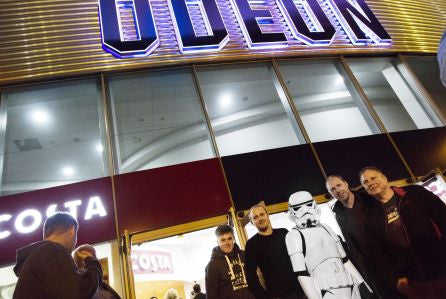How Quickly Will Local Movie Theaters Go Global Following AMC-Odeon Deal?

AMC Theatres has a message today for those who thought that the UK’s Brexit vote and Donald Trump’s success in becoming the GOP’s presumptive presidential nominee indicated that globalization has run its course.
Wake up and smell the popcorn.
AMC’s $1.2 billion cash and stock agreement to buy Odeon & UCI Cinemas — which, if approved by European antitrust officials, would make it the world’s largest exhibition chain — illustrates how quickly and easily capital continues to slosh across borders.
Indeed, the trend is so powerful that we’re now seeing the internationalization of one of media’s most local businesses: movie theaters.
A handful of global consolidators are poised to drive these transactions. They offer the deep pockets and scale needed to keep up with ticket buyers’ rising expectations for comfort and concessions, new projection technologies, challenges from Netflix and other home entertainment providers — and Hollywood.
“The industry is already fairly consolidated with six major studios,” Imax CEO Rich Gelfond tells me. “But there are hundreds of exhibitors. And the exhibitors I’ve talked to think that to compete in a global business, and go toe-to-toe with the studios, they need to have global reach. This is only the beginning of that trend.”
AMC is at the center of exhibition’s new world. The USA’s No. 2 exhibition chain is 75% owned by Wanda Group, the leading theater owner in China. AMC appears to be a vehicle for Wanda to expand globally without being subject to Chinese government controls and capital restrictions.
Others also are poised to become global leaders. The list of potential consolidators includes South Korea’s CJ-CGV (which just acquired Turkey’s biggest chain, Mars Cinema), Mexico’s Cinepolis (the world’s No. 4 chain) and UK’s Cineworld Group.
Dealmakers must tread lightly into cross-border acquisitions, though. Distant executives have often found that they offered little to local theaters. Venues thrive when managers understand cultural nuances that influence what movies their neighbors want to see, and what concessions they want to buy.
Consolidation “has been something that exhibition conglomerates have been doing, not necessarily successfully, since the ’90s,” one studio executive says.
But the rationale for deals becomes more compelling as Hollywood loads up on movies designed to appeal to global audiences. International markets accounted for 71% of the total box office in 2015, up from about 64% in 2006.
AMC and Wanda were quick to appreciate that size matters when dealing with giant studios and other service providers.
Although the exhibition operations are separate, “when we go to Hollywood we can go to Hollywood together,” AMC chief Adam Aron told investors today. “When we talk to vendors we can talk to vendors together. …We’re going to play an important role in the world’s movie theater industry.”
Wanda also can approach studios as a colleague. In January it paid $3.5 billion for Legendary Entertainment, which helped to make films including Straight Outta Compton, Jurassic World, and The Dark Knight Rises. This was the largest cross-border cultural acquisition by a Chinese company.
Wanda hopes to command 20% of the worldwide box office, a plan that’s “very much on track,” says Jack Gao, who’s VP of Wanda Cultural Industry Group and Head of Wanda Film Holdings.
AMC also brings a playbook to help exhibition venues stand out in a business where everybody offers the same movies with similar ticket prices.
The Kansas City-based company took a gamble in the U.S. when it spent heavily to install plush recliner seats, build large screen venues (it’s the leading domestic owner of Imax theaters), and upgrade concessions.
That paid off as customers willingly paid higher ticket prices for the superior entertainment and comfort.
AMC’s success forced risk-averse U.S. competitors to accelerate their spending plans. It’s one reason Carmike cried “uncle” in March, accepting AMC’s $1.1 billion acquisition offer — which some large investors say is too low. (They’ll vote on the deal this Friday.)
Carmike management told shareholders that the nation’s No. 4 chain “features theaters which, because of their age, will require greater levels of go forward investment relative to the circuits of Carmike’s peers.”
Aron says the strategy will work at Odeon & UCI’s theaters as they become “a first mover in Europe” for major upgrades.
That might lead small exhibition companies in the continent to decide, as Carmike did, that it’s time to look for an exit.
“If you look at the multiplex of the future, you’re going to have to put capital into it,” Gelfond says.
Local theaters will have to look for cash. And, as AMC showed today, money not only talks. It’s multilingual.
Contributing: Nancy Tartaglione
- AAMA Silicon Valley





